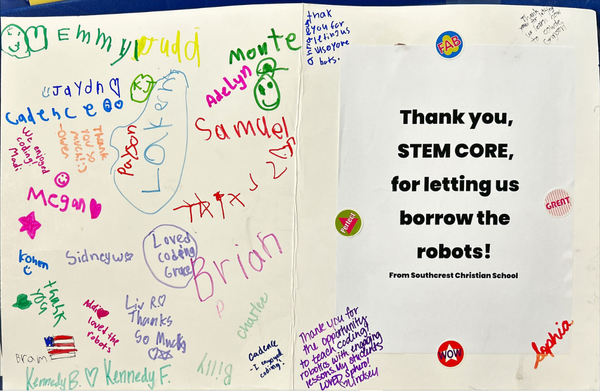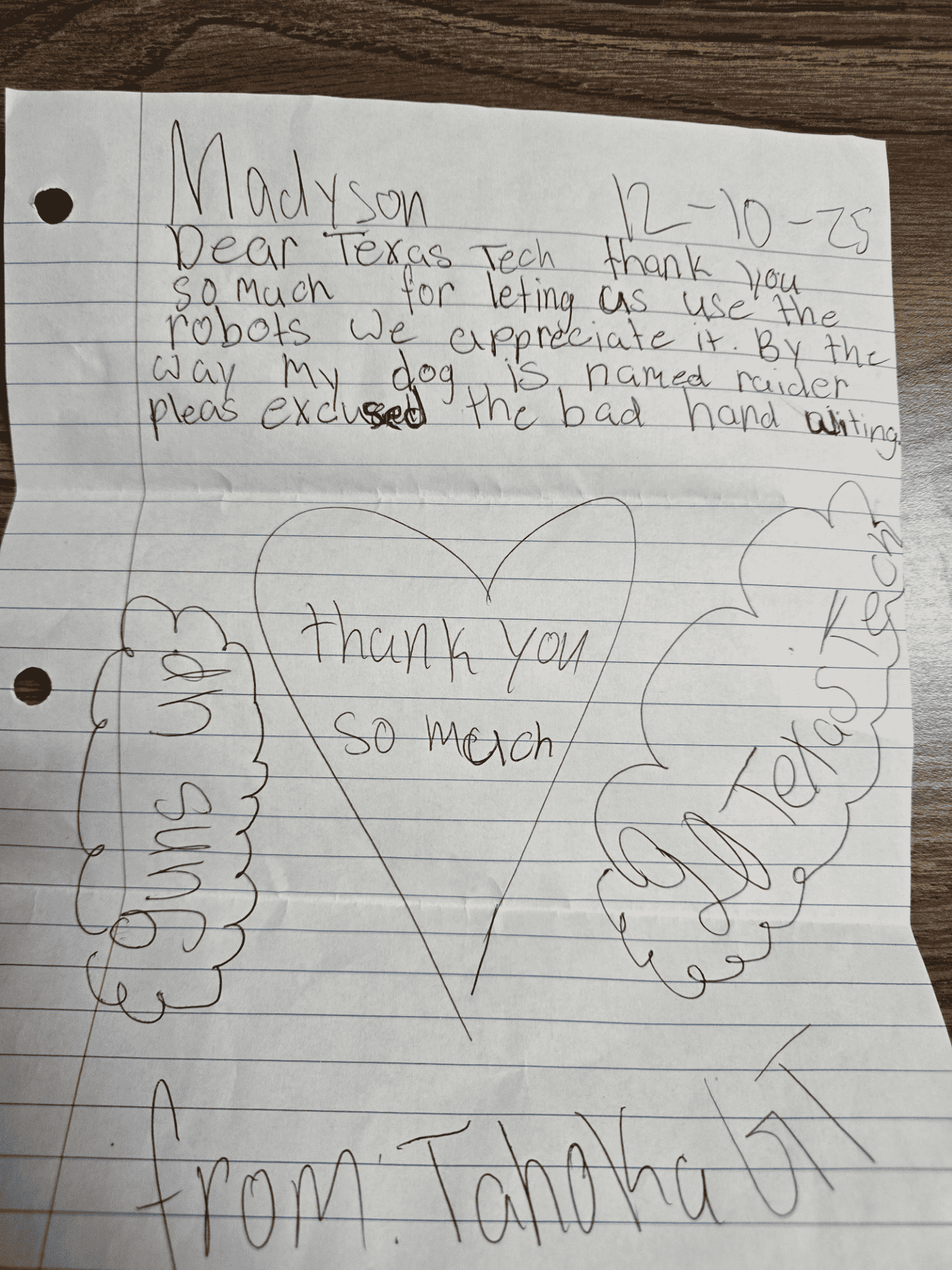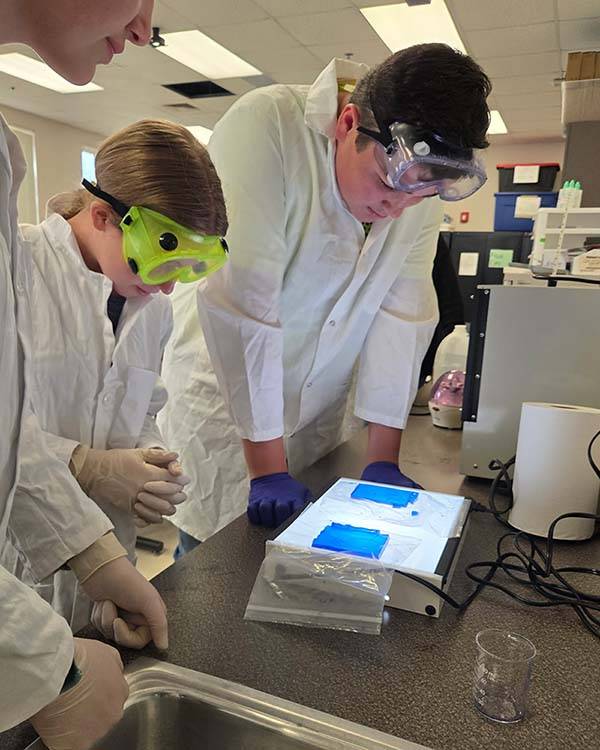STEM Traveling Labs
Engage K-12 Students with these Fun Labs!
Traveling Labs deliver hands-on STEM activities directly to elementary, middle, and high school classrooms with a minimum of 15 students across Lubbock and the South Plains within a 100 mile radius of Texas Tech University. These activities are designed to match TEKS standards and to enhance what you are already teaching in your classroom. The STEM CORE team continues to update existing labs and create new ones to keep the learning experience fresh and exciting for students. Homeschool teachers are welcome to check out labs that do not contain laboratory chemicals. Labs marked with an asterisk are not suitable for home classrooms.
New this year:
- From Seed to Scientist-Mini Lab for Kindergarten
- Physics in Action: Forces, Motion, and Real-World Systems for High School
- Equipment Only Check Out
Available Labs
New! Elementary School - From Seed to Scientist- Mini Lab for Kindergarten
Cover six Kindergarten Science TEKS with this one mini lab! Engage your students as they learn the structures and needs of plants, the plant life cycle, how young plants resemble their parents, and about botanist Ynes Mexia, the "Queen of Leaves." Students will learn how to use a microscope (included) as well as plant seeds and observe the growth of microgreens. This lab includes six different learning centers with all of the materials-just add water! A special snail puppet is also included for fun interactions and instruction. Science TEKS: Kindergarten: K.4A, K.4B. K.12A, K.13A, K.13C, K.13D
Elementary School - Force & Motion 3rd-5th Grade
Make physics concepts related to force and motion come alive in your classroom with this lab. Introduce key vocabulary and concepts utilizing three different marble tracks with photogates. Cover multiple TEKS as students design their own experiments to test the effects of angles and mass using a car and ramp system with photogates. This lab also includes an activity where students experiment with different friction surfaces using their own shoe and a spring scale. Don't miss out on getting this very popular lab scheduled for your classroom!
Science TEKS: 3rd Grade: 3.7A, 3.8B; 4th Grade: 4.7; 5th Grade: 5.7A, 5.7B
Elementary School - Technology Applications: Sphero Bolts-5th Grade
Looking for a fun way to teach coding and technology applications? Check out this super fun lab complete with a set of 15 Spheros and 10 iPads along with an Educator Guide that includes lesson activities for math, geography, and computer science. Also included: 1 double sided Sphero City and Golf Code Mat along with 3 sets of coding cards that provide a simple way to learn coding, math, and problem-solving. Recommended for 5th grade.
Technology Applications TEKS: 5th Grade: 5.1A, 5.1B, 5.1C, 5.1D; 5.2A, 5.2B, 5.2C, 5.3A, 5.3B
Elementary School - Technology Applications: Indi Fun for K-2
Engage your K-2nd graders in beginning computer science principles with these entry level Indis. This lab includes 7 Indis with 7 iPads, 8 sets of color tile cards along with an Educator Guide that includes lesson activities for K-2nd grade. Lessons reinforce concepts such as colors, patterns, sequences in nature, math, and early coding concepts.
Technology Applications TEKS: Kindergarten: K.1B, K.1C, K.2; 1st Grade: 1.1A, 1.1B, 1.1C, 1.2 2nd Grade: 2.1A, 2.1B, 2.1C, 2.1D, 2.2A, 2.2B, 2.3 A, 2.3B
Elementary School - Electronics-4th & 5th Grade
Allow your students to explore circuit construction first-hand as they discover how electrical energy functions. Reinforce key concepts through student investigations of conductors and insulators and other inquiry-based activities and games. The lab concludes with an Evaluation activity during which your students "interview" for a position at STEM CORE Electronics where they must demonstrate their knowledge of circuits by analyzing and solving a broken circuit!
Science TEKS: 4th Grade: 4.8A, 4.8B, 4.8C; 5th Grade: 5.8A, 5.8B
Elementary School - Investigation of Weddell Seals-3rd-5th Grade
Take your classroom on a virtual field trip to Antarctica and introduce them to the Weddell Seals that live within the Ross Sea. Why not cover multiple Science TEKS as students learn how to map Antarctica, discover a typical food web, analyze the diving behavior of Weddell Seals, and practice how to measure a seal. This lab includes real-life Extreme Cold Weather Gear on loan from the National Science Foundation! Students will become familiar with this extreme environment, how animals have adapted to survive in Antarctic conditions, and about the careers needed for the community and research facility in Antarctica to thrive.
Science TEKS: 3rd Grade: 3.1A, 3.1B, 3.1D, 3.1E, 3.1F, 3.2B, 3.3A, 3.3C, 3.4A, 3.4B, 3.12A, 3.12B, 3.13A 4th Grade: 4.1A, 4.1B, 4.1D, 4.1E, 4.1F, 4.2B, 4.3A,4.3C, 4.4A,4.4B, 4.12A,4.12B, 4.13A,4.13B. 5th grade: 5.1A, 5.1D, 5.1E, 5.1F, 5.2B, 5.3A, 5.3C, 5.4B, 5.12A, 5.12B, 5.12C, 5.13A, 5.13B
Social Studies TEKS: 3rd Grade: 3.3A, 3.4A
Elementary School - Earth Science: Igneous is Bliss 3rd-5th Grade
Pick and choose your activities from this lab packed with lessons applicable to a number of different Earth Science TEKS. Students will gain a deeper understanding of erosion, deposition, and weathering and the landforms that result from these processes through the use of the stream table. Engage your students with activities that mimic such natural disasters as landslides and exploding volcanoes. Allow for predictions as students analyze fossils for organisms and create cast fossils. There are even lessons on natural resources and the solar system. Use just one activity or use them all!
Science TEKS: Third Grade: 3.1G, 3.9A, 3.9B, 3.10C, 3.11A, 3.11B, 3.11C; 4th Grade: 4.1G, 4.10B, 4.11 A, 4.11B, 4.12C; 5th Grade: 5.9, 5.10B, 5.10C, 5.11
Middle School - Earth Science: Not My Fault
This kit contains six lessons that allow students to discover how movement of the Earth's crust can contribute to the formation of different landforms as well as cause natural disasters. Students will also take a closer look at the rocks and minerals that make up Earth's crust. All lessons include real world examples and applications and are TEKs specific. Student activities range from charting earthquakes in real time in order to recognize their occurrence along plate boundaries to identifying 15 different unknown minerals. Additional lab titles highlight the following topics: plate tectonics, the formation of mountains via folding and faulting, the rock cycle, and orbits.
TEKS: 6.2A, 6.6C, 6.10BC, 7.2A, 7.9B, 7.10A, 7.10B, 8.2A
Middle School - Chemistry: We Built this ViscoCITY
Introduce your students to the fascinating world of states of matter and non-Newtonian fluids! In this lab, students will make slime, explore Silly Putty, create plastic from milk, and experiment with hydrogels, magnetic fluids, and liquid races. This fun and hands-on lab is designed to engage 6th grade students in learning about rheology.
TEKS: 6.1A, 6.1B, 6.1D, 6.6A, 6.6B, 6.6D, 6.6E, 6.7A
Middle School - Technology Applications: Sphero Bolts
Looking for a fun way to teach coding and technology applications? Check out this super fun lab complete with a set of 14 Spheros and iPads along with an Educator Guide that includes lesson activities for math, geography, and computer science. Also included: 1 double sided Sphero City and Golf Code Mat along with 3 sets of coding cards that provide a simple way to learn coding, math, and problem-solving.
Technology Applications TEKS: 6th Grade: 6.1A, 6.1B, 6.1C, 6.1D, 6.1E, 6.1F, 6.2A, 6.2B; 7th Grade: 7.1A, 7.1B, 7.1C, 7.1D, 7.1E, 7.1F, 7.2A, 7.2B; 8th Grade: 8.1A, 8.1B, 8.1C, 8.1D, 8.1E, 8.1F, 8.2A, 8.2B
Middle School/High School-Chemistry: It's Elemental *
Get ready to dive into the thrilling world of atoms, elements, and chemical reactions in our hands-on chemistry lab! Students test nine common household substances to determine the composition of a "mystery mixture" of two of the substances. Students will analyze the compounds for elements and learn about the chemical formula and its meaning. They will deepen their understanding of atomic structure by building atoms from the nucleus up and gain understanding of reactivity, simple bonding, and shared element group characteristics through interactive class activities. Finally, students take on the role of scientist and learn to identify elements based on density, and learn how to categorize metals, nonmetals, and metalloids based on appearance, malleability, conductivity, and reactivity. It’s an exciting mix of critical thinking, discovery, and interactive fun that helps students see chemistry as a powerful tool for understanding the world around them.
Middle School TEKS: 6.1A, 6.1B, 6.1C, 6.1D 6.1G, 6.2A, 6.6B, 6.6C, 6.6D, 6.6E, 8.1B, 8.1C, 8.1E, 8.1G, 8.2A, 8.6E
High School TEKS: C.1, C.1A, C.1B, C.1C, C.1D, C.1E, C.2B C.2C, C.3C, C.5A, C.5B, C.5C, C.6A, C.6B, C.6E, C.7B, C.7C, C.9A
New! High School - Physics in Action: Forces, Motion, and Real-World Systems*
Dive into this three-week high school inquiry-based physics traveling lab where force
and motion come to life through hands-on investigations using cars, ramps, springs,
and projectile systems. Students apply Newton’s Laws to one- and two-dimensional motion,
use free-body diagrams to analyze forces and predict acceleration, and collect and
statistically analyze data using standard deviation. Students connect concepts of
friction, forces, and motion with real-world applications of braking distance, water
rockets, and projectile motion challenges by integrating multiple physics concepts
to solve complex problems.
TEKS: P.1(B). P.1(D), P.1(E). P.1(F). P.2(B), P.2(C), P.2(C), P.5(A), P.5(B). P.5(C),
P.5(D), P.5(E), P.5(F). P.5(G)
High School - Tiny is Mighty: Investigating Cells*
Get ready to explore the microscopic world like never before. This three-part lab brings key biology concepts to life through immersive, hands-on investigations that challenge students to think critically and engage with the unseen forces of life. Students will compare prokaryotes and eukaryotes while learning about cell theory and endosymbiotic theory, using real scientific tools like light microscopes and gram staining to observe cells firsthand. They'll uncover the principles of homeostasis through role-play activities, investigate blood sugar regulation, and model diffusion, osmosis, and active transport. Finally, students become virologists—comparing viruses and bacteria, researching real-world pathogens, and exploring how viruses spread. They'll also dive into modern medicine by investigating antibiotic resistance and monoclonal antibody production through the Kirby-Bauer Antibiotic Resistance Lab.
Optional Equipment: Compound Light Microscopes & Incubator
TEKS: B.5B, B.5C, B.5D
High School - Biotechnology: DNA Electrophoresis Mini Lab*
Step into the shoes of a scientist as your classroom transforms into a high-tech genetics
or forensics lab! Students get hands-on with DNA electrophoresis equipment to explore
high-stakes scenarios where molecular biology meets the real world. In this lab, the
freedom is yours to relate to the current concepts you are teaching. Whether it’s
solving a forensic investigation, identifying a genetic disorder, confirming paternity,
tracing evolutionary relationships, or detecting genetically modified organisms, students
have the opportunity to analyze DNA samples and use critical thinking skills.
TEKS: B.1D, B.7D
High School - Body Systems: Case by Case Investigation
Engage students in a role-playing activity to learn about the eleven body systems. As interns, they study the symptoms of assigned patients in an emergency room setting. Students are challenged to determine which diagnostic tests to run, in addition to learning the normal values for each of these tests. Activities include blood typing (artificial blood), lung function testing, blood pressure monitoring, bone dissection, suture technique and examination of X-rays. At the conclusion of the lab, each student group gives a presentation, explaining their patient's symptoms, diagnostic test results, and prognosis.
Optional Equipment: Compound Microscope & amp; Light Microscope
High School - Water Chemistry: Water We Waiting For?*
Get ready to dive into one of the most powerful substances on Earth—water! In this electrifying traveling lab, students will explore water’s hidden powers by uncovering its unique molecular structure and watching it shift between solid, liquid, and gas. But that’s just the beginning. They’ll unlock the secrets of solutions and aqueous chemistry, test acids and bases in pH experiments, and discover why hydrogen holds the key to powerful reactions. With hands-on activities in electrochemistry and real-world applications, students won’t just learn science—they’ll experience it. Water you waiting for?
TEKS: C.11 E, C.12B, C.12C, C.12D, C.12E, C.13D
Equipment Only Available for Checkout:
- Compound Microscope
- Dissection Microscope
- Stream Table
- Spectrophotometer
- Incubator
Request a Traveling Lab or Equipment Only Checkout



Coming Soon:
- Elementary Mini Labs: Life Cycles for 1st and 2nd grade
- Middle School: Force & Motion

STEM CORE
-
Address
1008 Canton Ave. Lubbock, TX 79409-1087 -
Phone
806.742.0218 -
Email
stem-core@ttu.edu
